
Sweet Honey in the Rock is an all-woman, African-American a cappella ensemble. They are an American three-time Grammy Award–nominated troupe who express their history as black women through song, dance, and sign language. Originally a four-person ensemble, the group has expanded to five-part harmonies, with a sixth member acting as a sign-language interpreter. Although the members have changed over five decades, the group continues to sing and perform worldwide.
Carol Lynn Maillard is an American actress, singer, and composer. She is one of the founding members of the Grammy Award-winning a cappella ensemble Sweet Honey in the Rock.

The Student Nonviolent Coordinating Committee was the principal channel of student commitment in the United States to the civil rights movement during the 1960s. Emerging in 1960 from the student-led sit-ins at segregated lunch counters in Greensboro, North Carolina, and Nashville, Tennessee, the Committee sought to coordinate and assist direct-action challenges to the civic segregation and political exclusion of African Americans. From 1962, with the support of the Voter Education Project, SNCC committed to the registration and mobilization of black voters in the Deep South. Affiliates such as the Mississippi Freedom Democratic Party and the Lowndes County Freedom Organization in Alabama also worked to increase the pressure on federal and state government to enforce constitutional protections.

Guy Hughes Carawan Jr. was an American folk musician and musicologist. He served as music director and song leader for the Highlander Research and Education Center in New Market, Tennessee.

"We Shall Overcome" is a gospel song that is associated heavily with the U.S. civil rights movement. The origins of the song are unclear; it was thought to have descended from "I'll Overcome Some Day," a hymn by Charles Albert Tindley, while the modern version of the song was first said to have been sung by tobacco workers led by Lucille Simmons during the 1945–1946 Charleston Cigar Factory strike in Charleston, South Carolina.
Ella Jenkins is an American folk singer and actress. Dubbed "The First Lady of the Children's Folk Song" by the Wisconsin State Journal, she has been a leading performer of children's music for over 50 years. Her album, Multicultural Children's Songs (1995), has long been the most popular Smithsonian Folkways release. She has appeared on numerous children's television programs and in 2004, she received a Grammy Lifetime Achievement Award.

Sallie Martin was an American gospel singer referred to as the "Mother of Gospel" for her efforts to popularize the songs of Thomas A. Dorsey and her influence on other artists.

Toshi Reagon is an American musician of folk, blues, gospel, rock and funk, as well as a composer, curator, and producer.
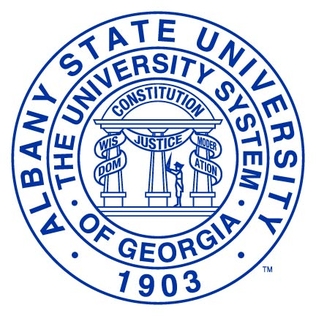
Albany State University is a public historically black university in Albany, Georgia. In 2017, Darton State College and Albany State University consolidated to become one university under the University System of Georgia (USG). Albany State University has two campuses in Albany and a satellite campus in Cordele.
The Albany Movement was a desegregation and voters' rights coalition formed in Albany, Georgia, in November 1961. This movement was founded by local black leaders and ministers, as well as members of the Student Nonviolent Coordinating Committee (SNCC) and the National Association for the Advancement of Colored People (NAACP). The groups were assisted by Martin Luther King Jr. and the Southern Christian Leadership Conference (SCLC). It was meant to draw attention to the brutally enforced racial segregation practices in Southwest Georgia. However, many leaders in SNCC were fundamentally opposed to King and the SCLC's involvement. They felt that a more democratic approach aimed at long-term solutions was preferable for the area other than King's tendency towards short-term, authoritatively-run organizing.

"Marching Song of the First Arkansas Colored Regiment" is one of the few Civil War-era songs inspired by the lyrical structure of "The Battle Hymn of the Republic" and the tune of "John Brown's Body" that is still performed and recorded today. The "Marching Song" has been described as "a powerful early statement of black pride, militancy, and desire for full equality, revealing the aspirations of black soldiers for Reconstruction as well as anticipating the spirit of the civil rights movement of the 1960s." The song's lyrics are attributed to the regiment's white officer, Captain Lindley Miller. An almost identical song, "The Valiant Soldiers," is attributed to Sojourner Truth in post-Civil War editions of her Narrative. Recent scholarship supports Miller as the original author, or at least compiler, of the song.
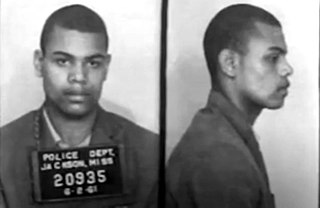
Cordell Hull Reagon was an American singer and activist. He was the founding member of The Freedom Singers of the Student Nonviolent Coordinating Committee (SNCC), a leader of the Albany Movement and a Freedom Rider during the Civil Rights Movement.

The Freedom Singers originated as a quartet formed in 1962 at Albany State College in Albany, Georgia. After folk singer Pete Seeger witnessed the power of their congregational-style of singing, which fused black Baptist a cappella church singing with popular music at the time, as well as protest songs and chants. Churches were considered to be safe spaces, acting as a shelter from the racism of the outside world. As a result, churches paved the way for the creation of the freedom song. After witnessing the influence of freedom songs, Seeger suggested The Freedom Singers as a touring group to the SNCC executive secretary James Forman as a way to fuel future campaigns. Intrinsically connected, their performances drew aid and support to the Student Nonviolent Coordinating Committee (SNCC) during the emerging civil rights movement. As a result, communal song became essential to empowering and educating audiences about civil rights issues and a powerful social weapon of influence in the fight against Jim Crow segregation. Rutha Mae Harris, a former freedom singer, speculated that without the music force of broad communal singing, the civil rights movement may not have resonated beyond of the struggles of the Jim Crow South. Their most notable song “We Shall Not Be Moved” translated from the original Freedom Singers to the second generation of Freedom Singers, and finally to the Freedom Voices, made up of field secretaries from SNCC. "We Shall Not Be Moved" is considered by many to be the "face" of the Civil Rights movement. Rutha Mae Harris, a former freedom singer, speculated that without the music force of broad communal singing, the civil rights movement may not have resonated beyond of the struggles of the Jim Crow South. Since the Freedom Singers were so successful, a second group was created called the Freedom Voices.
Dr. Horace Clarence Boyer was one of the foremost scholars in African-American gospel music.

Monroe Comprehensive High School (MCHS) is a four-year secondary school located in Albany, Georgia, United States. It is one of three high schools in the Dougherty County School System, which also includes Dougherty Comprehensive High School and Westover Comprehensive High School.
Charles "Chuck" Neblett is a civil rights activist best known for helping to found and being a member of The Freedom Singers.
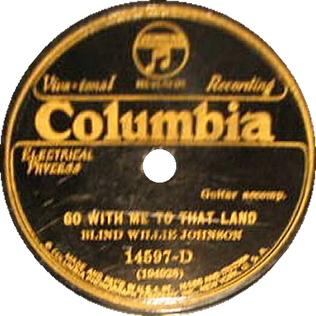
"Go with Me to That Land" or "Come and Go with Me (to That Land)" is a traditional gospel blues song recorded on April 20, 1930 by Blind Willie Johnson with backing vocals by Willie B. Harris, who may have been his first wife. It was released as a single on Columbia 14597-D, backed with "Everybody Ought to Treat a Stranger Right".
McCree L. Harris was an American educator and political activist leader. Harris worked at the all-Black Monroe Comprehensive High School, where she taught Latin, French, and Social Studies. She is best known for her participation with the Freedom Singers and for encouraging her students' involvement in the Civil Rights Movement through voter registration marches and by leading groups of students to downtown Albany, Georgia, after school hours to test desegregation rulings at local stores and movie theaters.
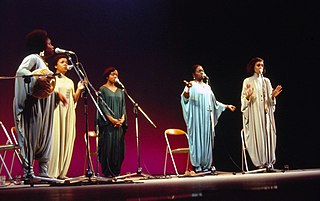
Yasmeen Williams is an American gospel singer and former member of the African American a cappella ensemble Sweet Honey in the Rock.
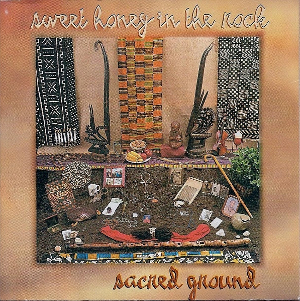
Sacred Ground is an album by the American a capella group Sweet Honey in the Rock, released in 1995. The group supported the album with a North American tour.














